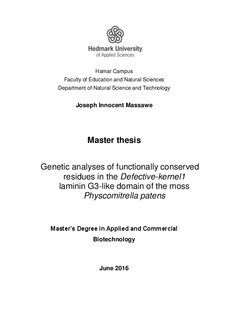Genetic analyses of functionally conserved residues in the Defective-kernel1 laminin G3-like domain of the moss Physcomitrella patens.
Master thesis
Permanent lenke
http://hdl.handle.net/11250/2406530Utgivelsesdato
2016Metadata
Vis full innførselSammendrag
DEFECTIVE KERNEL1 (DEK1), the single calpain of land plants, is highly conserved over the past 450 million years and it has been shown that the protein is essential for determining cell wall orientation in 3D growth. A recent study reveals that the DEK1-Arm segment harbour a conserved LG3 domain belonging to the Laminin-like globular domain family (LG3). In the current study, assessment of conserved residues in DEK1-LG3 for DEK1 function in Physcomitrella patens was investigated. This was achieved by substituting residues predicted to be functionally important in the DEK1-LG3 domain with alanine (Ala). Five (5) plasmid vectors for targeted insertion of mutagenized version of DEK1-LG3 were constructed and then re-targeted to the DEK1ΔLG3 locus in the dek1Δlg3 mutant background. The resulting mutant plants were subsequently characterized both molecularly and phenotypically to assess the importance of the conserved amino acids for DEK1 function. Results suggest that the amino acids E1477, Q1478, E1481 and S1497 have no important function for protonemata growth or gametophore development as the mutant plants displayed the WT phenotype. However, the mutations introduced into the dek1lg3:R1514 mutant affected post-transcriptional processing of the DEK1 transcript, resulting in a Δdek1 mutant phenotype. Targeting of the pBHRF_JI_LG3:G1574R1575S1576D1577S1578E1579 vector into the DEK1ΔLG3 locus in the dek1Δlg3 mutant did not result in any re-generating plants, suggesting that the introduced mutations are lethal to P. patens.
Beskrivelse
Mastergradsoppgave i næringsrettet bioteknologi, Avdeling for lærerutdanning og naturvitenskap, Høgskolen i Hedmark, 2016. Master of applied and commercial biotechnology.
